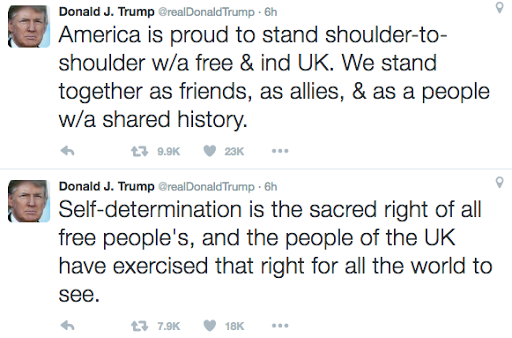The unlikely has happened. Acting on their frustrations with a political class deaf to their very real concerns, the citizens of the United Kingdom on Thursday voted to exit the European Union.
Unfortunately, by sticking it to their so-called “betters” and telling the meddlesome bureaucrats in Brussels to bugger off, the British electorate’s righteous anger may come back to bite Brits in the you-know-where. And if the simmering American version of this frustration should boil over in November, we too could face consequences that could make things worse, not better.
A Burning Anger
Why the frustration?
Globalization has spawned a host of interrelated and unexpected opportunities and challenges that have decimated the middle and working classes in the West. Cheap, third world manufacturing and free trade agreements are part of the problem, as is relentlessly advancing technology that replaces well-paying jobs with algorithms.
Throw in mobile apps that put virtually free instant global communication at everyone’s fingertips; an Arab world that is descending into chaos, spreading refugees and terrorism in its wake; and central bankers whose policies benefit the rich now and not-so-rich maybe never, and you’ve concocted a very unpleasant stew.
Many people who have lived their lives by the rules, for the most part, find themselves in a world that doesn’t make much sense. Unlike the 1950s and 1960s when things generally seemed to be getting better, now it seems as if things are stagnating or getting worse. Even our health is deteriorating: opioid use is at epidemic levels and the death rate for white, less educated middle-age Americans is rising.
No Easy Answers
Politicians are always available with easy (and typically useless) answers in exchange for votes, and this election cycle is no different. In Western nations, politicians hearkening back to the way things were, promising to make nations great again, and defending the polity from onrushing hordes from outside the nation and predatory elites inside the nation feed on the discontent.
When you’re in pain and looking for answers, anyone riding in on a white horse and providing “The Answer” is appealing. Elites see this phenomenon as the Luddite booboisie latching onto proto-fascist rabble-rousers. But the elites miss the pain and their own hubris, which fuel this ache for something better.
Unfortunately, there are no easy answers to our current challenges. In Europe, the white horse candidates push for a return to xenophobic nationalism that is all too reminiscent of the 1930s. Here, the white horse candidate is a blowhard who is far too narcissistic to care about anyone other than himself, so poorly self-disciplined or so poorly endowed intellectually that he shuns the thought necessary for policy development, and so dangerously smug in his ignorance that he didn’t know what Brexit meant until the first week of June!
Woe to Europe and woe to us if these false messiahs come to power.
The Orange-Haired Knight on a White Horse

The Real Answers
What’s truly needed to get us out of the current mess is compassion for those bearing the brunt of the forces reshaping the economy, more investment in education and infrastructure to prepare us for the future and to provide current jobs, and recognition that problem-solving is more likely to come from lots of decentralized public and private efforts rather than top-down directives. Knights on white horses need not apply.
In the U.K., the path forward probably would have been better accomplished by staying in the E.U. With all member nations feeling pressure, remaining in the Union could have given Britain leverage to push for reforms. Even if that hadn’t worked, the tensions between European haves and have-nots seem to be pushing the Union into some sort of devolution or reorganization anyway, in which a Britain that stayed could have gotten more of what it wanted.
What Lies Ahead
Now that’s all moot. For the next year or two, Britain will be sorting out the exit process. That probably will serve only to make things worse for the average Brit since the U.K.’s largest trading partners are member states of the European Union. As a result, the British economy will now operate with a massive injection of uncertainty, throwing markets, interest rates, the currency, and almost everything else that eventually trickles down to the average citizen into disarray.
While it may have thought of itself akin to Switzerland, which could prosper without being part of official Europe, Britain doesn’t have Switzerland’s small, trained, and educated workforce, nor its specialized, high-value-added manufacturing capacity. The U.K. is more like a big New York State — a glittering international city (in this case, London) that is home to the world’s mega rich, a struggling middle class, and homegrown and immigrant poor; a ring of relatively prosperous suburbs; and a formerly industrial north that aside from a few bright spots is slipping further into decline.
So when it marches off on its own, Britain will be a weaker, isolated nation.
Maybe, if we’re lucky and not too dense to seize the opportunity, the U.S., the U.K., Canada, Australia, and New Zealand could join in an English-speaking economic union in which each member nation would retain full sovereignty (we could keep our guns and Canadians could keep their medical system) while we all enjoy the benefits of free trade and open borders.
But that and other desirable changes would require political leadership, forward-looking thinking and elites that have a sense of noblesse oblige or enough enlightened self-interest to put the interests of average people first for a change, rather than coming up with better ways to cut them out.
If it serves as a wake-up call for the U.S. elites, maybe the Brexit vote will do some good. But for us and for the British people, who face a transition that’s bound to be painful, I’m not especially hopeful that the lesson will be learned.





